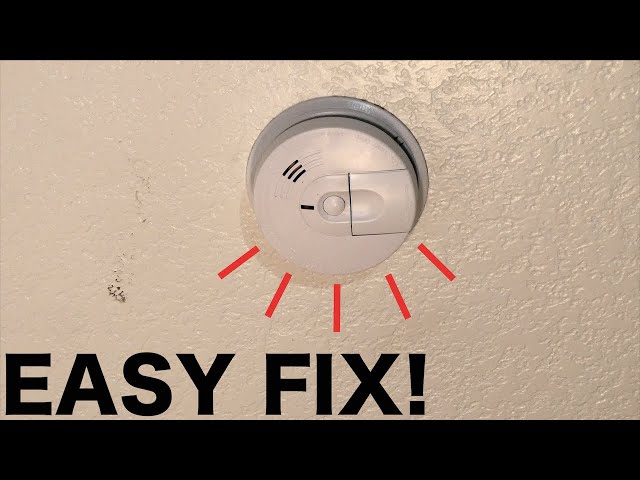Have you ever been startled in the middle of the night by a sudden, loud fire alarm—only to find out there’s no smoke or fire? If so, you’re not alone. Many homeowners and renters face this annoying issue. So, why does fire alarm randomly go off without a clear reason? This guide explores the common causes, solutions, and tips to prevent future false alarms.
Common Reasons Why Fire Alarm Randomly Goes Off
Understanding why does fire alarm randomly go off begins with knowing how fire alarms work. They detect smoke particles, heat, or fire-related gases. However, they can also be triggered by other elements. Let’s explore the most frequent culprits.
1. Low or Dying Battery
One of the most common reasons a fire alarm beeps randomly is a low battery. As the battery loses charge, the system emits random alerts to signal it needs replacing. Even hardwired alarms have backup batteries that cause this issue when weak.
Solution: Replace your fire alarm batteries every six months. Most alarms will chirp or sound off randomly when battery voltage drops.
2. Dust or Insect Buildup
Fire alarms are sensitive to small particles. Dust, cobwebs, or even tiny insects inside the unit can interfere with its sensors and cause false alarms.
Solution: Clean your fire alarm regularly using a vacuum or soft cloth. Avoid spraying anything directly onto the sensor.
3. Humidity and Steam
Bathrooms and kitchens are hotspots for false alarms. High humidity or steam from showers and cooking can trigger the sensor as if it were smoke.
Solution: Install fire alarms away from bathrooms and stoves. Use ventilation fans to reduce moisture in the air.
4. Power Surge or Interruption
A sudden loss or restoration of power can trigger a fire alarm, especially in hardwired systems.
Solution: If your area experiences frequent outages, consider using a surge protector or upgrading your alarm system.
5. Expired Fire Alarm
Most fire alarms have a lifespan of 8–10 years. Over time, the internal components degrade and may malfunction, causing false triggers.
Solution: Check the manufacture date on the back of your alarm. Replace old alarms with new, reliable models.
Environmental Factors That Set Off Alarms
6. Aerosol Sprays
Using aerosol sprays like air fresheners, hairsprays, or cleaning products near a fire alarm can cause the particles to mimic smoke.
Solution: Keep aerosol use away from fire alarms. If needed, ventilate the area to disperse particles quickly.
7. Smoking Indoors
Even minimal cigarette smoke can trip some sensitive alarms, especially newer models that react to low particle levels.
Solution: Smoke outside or in well-ventilated rooms far from fire alarms.
8. Cooking Without Proper Ventilation
Burnt toast or searing food without turning on the kitchen fan can easily set off alarms.
Solution: Always use an exhaust fan while cooking, especially when frying, grilling, or baking.
Electrical and System-Based Issues
9. Interconnected Alarms
Many homes have interconnected fire alarms. If one goes off, they all do. If just one alarm malfunctions or collects too much dust, it can cause all others to go off randomly.
Solution: Test each unit individually. Replace or clean any one that appears faulty.
10. Wiring Problems
For hardwired systems, faulty or loose wiring may send random signals, making the alarm go off unexpectedly.
Solution: Hire a licensed electrician to inspect your system wiring if you suspect an issue.
How to Stop False Alarms
If your alarm goes off for no reason, take these steps:
-
Reset the alarm: Press and hold the test/reset button for 15–20 seconds.
-
Change the battery: Replace the battery even if it looks fine.
-
Clean the unit: Use a vacuum to clear any visible dust or insects.
-
Relocate the alarm: If frequent false alarms occur in one location, consider repositioning it.
-
Check expiration: Look at the manufacture date. If it’s over 10 years old, replace the unit.
Preventive Maintenance Tips
To avoid asking again, why does fire alarm randomly go off, follow these preventive steps:
Install Properly
Avoid installing fire alarms near windows, fans, humidifiers, or heat-producing appliances. Placement matters for reducing false alarms.
Test Monthly
Push the test button once a month to ensure your alarm functions correctly. This also helps you recognize the different alert sounds (low battery vs. real alarm).
Schedule Regular Cleaning
Dust and clean your alarms every few months. Use compressed air or a vacuum attachment for safe, effective results.
Use Smoke Alarms with Smart Features
New smart alarms can differentiate between types of smoke and particles, reducing false alerts. Some connect to your phone, giving real-time alerts even when you’re away.
When to Call a Professional
If none of the above solutions work, and you’re still wondering, why does fire alarm randomly go off, it’s time to contact a professional. An electrician or alarm technician can:
-
Test the alarm sensitivity.
-
Check for faulty wiring.
-
Update outdated systems.
-
Provide expert advice on proper installation.
Final Thoughts
A fire alarm is essential for your safety—but false alarms can be both frustrating and dangerous if they cause panic or complacency. By understanding why does fire alarm randomly go off, you can take practical steps to prevent disruptions and maintain a safe home. Regular maintenance, proper placement, and replacing old alarms are simple but effective ways to stop your fire alarm from randomly sounding off.




